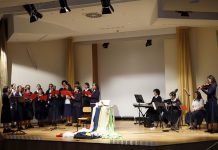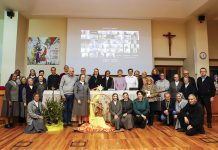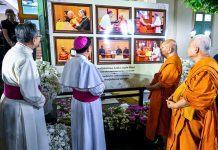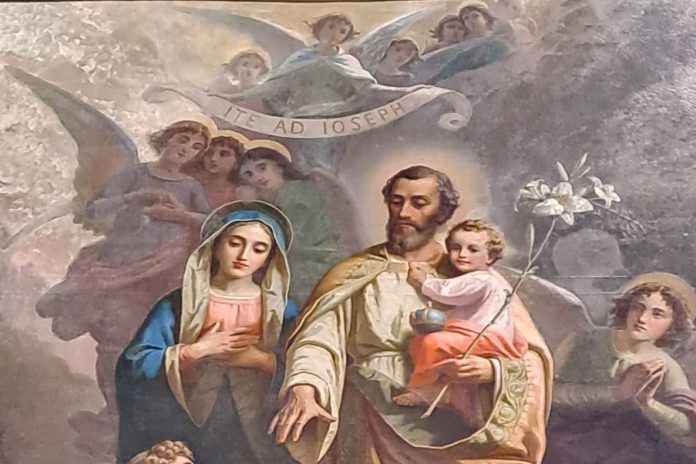Rome (Italy). On 19 March 2024, the Solemnity of Saint Joseph, patron of the Institute of the Daughters of Mary Help of Christians, is celebrated. In Mornese, he was considered by the community as guardian of the house. He who had guarded the Virgin Mary and Jesus in his life, continued to take care of the people who lived there.
“My beloved Saint Joseph,
Come to my house, I wait for you!
Come and see, what is lacking, you know
Come and look, what is missing bring.
And if something is not right for my house,
Come and take it away…”.
Moreover, the first notebook of the Manuscript Rules, dated 24 May 1871, bears the title “Constitutions Rules of the Institute of the Daughters of the Immaculate and of Mary Help of Christians under the protection of St. Joseph, St. Francis of Sales, and St. Teresa”.
Among the numerous publications of Don Bosco, “The Christian Daughter Provided for” (La figlia cristiana provveduta), in its fourth edition dated 1883, bears as a dedication under the image of the Holy Family, the exhortation of Pius IX, “Beloved children, turn to Saint Joseph and he will come to our aid in all our needs.” In the manual, certainly in use at the FMA houses, the Saint affirms, “Honor with special cult the chaste husband of Mary, St. Joseph custodian of the child J. C. and ours, and now of the universal Patron of the Church.”
Saint Joseph was also present in the life of Blessed Sister Maria Troncatti (1883-1969). In the FMA Constitutions of 1906 and 1922, which Sister Maria professed and lived throughout her missionary life, we read, “the feasts of St. Joseph, Saint Francis of Sales, Saint Teresa of Jesus, who are the particular patrons of the Institute, will be celebrated with special devotion.” The first Constitutions reflect the climate that the first FMA lived in Mornese.
Egidio Viganò wrote in Rediscovering the Spirit of Mornese in the year of the centenary of the Institute (1981), which was characterized above all by a “spirit of faith; fervent, simple, practical piety; constant care for union with God; fervor for the Eucharist; certainty in the help of Providence; lively sense of paradise; special devotion to Our Lady, to Saint Joseph, and to the Guardian Angel.”
Like the other FMA, Sister Maria Troncatti turned to the “Guardian of the Redeemer” in times of need and difficulty, always placing unlimited trust in Providence. In 1925, with two other sisters, Sister Domenica Barale, a Sister for just three years, and the novice Sister Carlota Nieto, Sister Maria arrived in Macas in the Vicariate of Mendez. The standard of living was very poor, indeed lacking even the necessities for life. In the face of this reality, Sister Maria offered the young Sister some programmatic and self-revealing indications. “There is no satisfaction for us here, but we must bear everything for love of God, because without this our life would be bitter.”
She, also in the difficulties and in the poverty, did everything for love of God in which every privation and suffering received with heroic spirit of faith found meaning. This poverty of the beginning is also witnessed by the Provincial of the time, Sister Decima Rocca who, writing to Mother General, Sister Luisa Vaschetti, tells her that in Macas water is also scarce and Saint Joseph is invoked in order to find a source.
She noted, “How many sacrifices our Sisters must impose on themselves and with how much generosity they accomplish this! […] Yesterday, I received a letter from Sister Troncatti telling me, ‘It’s been two months since we found a drop of milk and every morning breakfast consists of a little black coffee and a piece of yuca. I pity the Sisters who – poor things – feel exhausted.’ But immediately she adds, ‘The feast of Mary Help of Christians has been very solemn; two of our Kivarettes have made their First Communion. These are such great joys that they compensate for all sorts of suffering’.”
The Servant of God Mother Rosetta Marchese (1922-1984) also had a particular predilection for Saint Joseph. In a letter to her sister in 1981, she wrote, “I reciprocate first of all the wishes for St. Joseph; the dear Saint of silence, of humility, of deep union with Jesus and with Mary, helps us to understand the value of a silent, humble, and hidden work, but lived in intimate union with Jesus and with Our Lady. It is certain that the mystery of the house of Nazareth and the thirty years lived by Jesus there in hiddenness, must speak deeply to our hearts and really help us to understand the value of life which consists in duty done for love in order to give glory to God, without seeking any human glory and any earthly recognition.”
In a Good Night to the Community “Saint Lucy” of Palermo, 17 March 1977, Mother Rosetta says, “The practice for tomorrow makes us ask St. Joseph to grant us a measured word and brings us the phrase of the Letter of St. James, ‘Everyone must be ready to listen, but slow to speak.’ This ‘being ready to listen’ speaks of the capacity for listening, capacity that is a virtue that is acquired with the grace of God, asking for it intensely, and with the exercise of attention to ourselves; virtues so necessary in our mutual relationships, for the holiness of common life, so that community dialogue can truly become a reality.”
One could say that Saint Joseph accompanies the Institute, offering protection and example adapted to the situation of those who invoke him. His fatherhood remains a fundamental reference for those who daily desire to witness the love of God to young people.





















Grande San Giuseppe!
È meraviglioso che il nostro Istituto abbia San Giuseppe come patrono e che con tanta fiducia si affida e chieda di affidarci a lui. Di grande aiuto è l’esempio delle nostre sorelle.